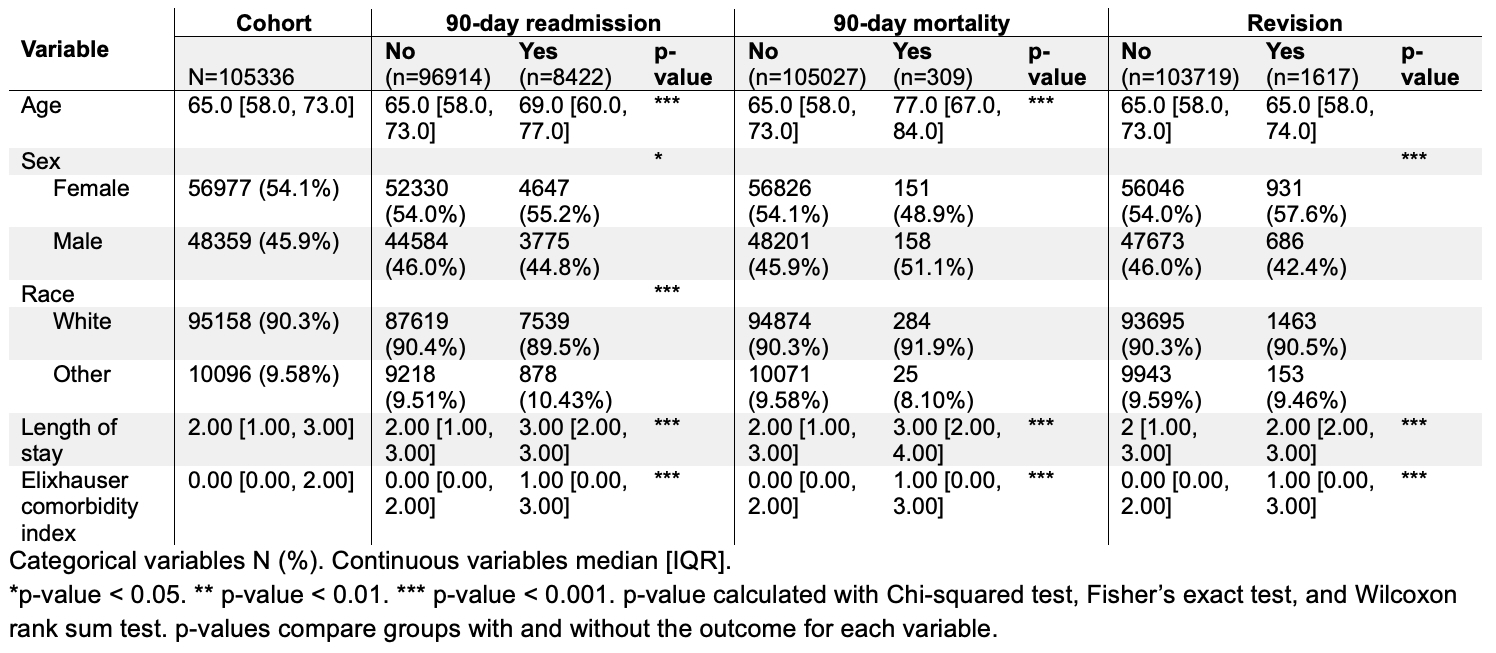Session Information
Date: Sunday, October 26, 2025
Title: Abstracts: Orthopedics, Low Back Pain, & Rehabilitation (0783–0788)
Session Type: Abstract Session
Session Time: 1:45PM-2:00PM
Background/Purpose: Utilization of total hip arthroplasty (THA) has grown rapidly in the United States and worldwide. Postoperative complications and patient risk is of great consideration by patients and clinicians. The risk associated with patient-level factors such as age has traditionally been examined using regression models, yet these models lack nuance necessary for detailed risk quantification. We aimed to examine the effect of age as a risk factor for adverse THA outcome through the application of modern machine learning algorithms.
Methods: Patients undergoing THA from 2012-2018 were identified from the Pennsylvania Cost Containment Database using ICD codes and included in the analysis. Patient-level covariates (demographics, discharge location, admission source, insurance, comorbidities) were extracted. Age was examined as a risk factor for the binary outcomes 90-day readmission, 90-day mortality, and 1-year revision as well as the continuous outcome length of stay (LOS) using an explainable boosting machine (EBM). EBMs are a form of generalized additive models characterized by high accuracy and full interpretability, mitigating effects for collinearity and allowing for automatic interaction detection. The predictive performance of the EBM model was described by area under the receiver operating curve (AUROC) for binary outcomes and root mean square error (RMSE) for continuous outcomes. The marginal relationship of age on adverse outcomes was characterized by partial dependency plots.
Results: We analyzed a cohort of 105,336 patients. The median age was 65.0 years, and most patients were White (90.1%), Medicare-insured (51.6%), and discharged home or to health home care (78.1%) (Table 1). The incidence of 90-day readmission was 8.00%, 90-day mortality was 0.29%, and 1-year revision was 1.54%. The EBM prediction model yielded highest prediction for mortality (AUROC=0.80), followed by readmission (0.68), revision (AUROC=0.60), and LOS (RMSE=0.41, R2=0.19). Of the examined patient-level demographics and covariates, age was identified as one of the most important factors in the prediction of each adverse outcome. 90-day mortality risk increased at 79.5 years, and again dramatically at 80.5 years. Conversely, risk of revision decreased at the age of 46.5 years, whereas risk of readmission decreased at 48.5 years but increased at 71.5 years. LOS risk decreased at 52.5 years and increased at 74.5 years (Figure 1).
Conclusion: Despite decreased rates of postoperative complications in THA, age remains a prominent risk factor for consideration in clinical decision making. Modern machine learning analysis demonstrated that the relationship between age and adverse THA outcomes is nonlinear, and risk for each outcome changes drastically at different ages. This finding provides a deeper and more nuanced model compared to logistic regression, which traditionally describe fixed changes in risk with age. This study can support personalized decision-making for patients and physicians in THA.
 Table 1. Patient level characteristics by outcome
Table 1. Patient level characteristics by outcome
.jpg) Figure 1. Partial dependency plots illustrating the marginal effect of age (years) on (A) 90-day mortality, (B) 90-day readmission, (C) 1-year revision, and (D) length of stay from the supervised explainable boosting machine models.
Figure 1. Partial dependency plots illustrating the marginal effect of age (years) on (A) 90-day mortality, (B) 90-day readmission, (C) 1-year revision, and (D) length of stay from the supervised explainable boosting machine models.
Y-axis score in log scale. Vertical lines demonstrate where risk score is equal to 0, and show the average contribution of age to risk.
To cite this abstract in AMA style:
Heiting C, Wu Y, Goodman S, Sculco P, Wang F, Caruana R, Cram P, Ibrahim S, Mehta B. A Machine Learning Approach to Understand Age as a Risk Factor for Complications After Total Hip Arthroplasty [abstract]. Arthritis Rheumatol. 2025; 77 (suppl 9). https://acrabstracts.org/abstract/a-machine-learning-approach-to-understand-age-as-a-risk-factor-for-complications-after-total-hip-arthroplasty/. Accessed .« Back to ACR Convergence 2025
ACR Meeting Abstracts - https://acrabstracts.org/abstract/a-machine-learning-approach-to-understand-age-as-a-risk-factor-for-complications-after-total-hip-arthroplasty/
